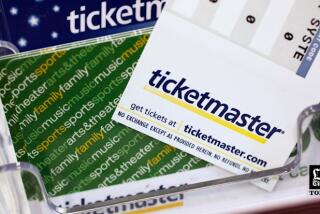Another Meaning for ATM: Airline Ticketing Machine : Trend: About 200 machines are in U.S. airports, hotels and retail shopping centers.
- Share via
For most of us, buying an airline ticket is still a matter of making a phone call, reciting credit card numbers and waiting for mail carriers to deliver our tickets, or perhaps driving to an airline office to pick them up ourselves. But a handful of companies are now vying to give air travelers a shortcut--via a network of remote airline ticketing machines.
The first of these travelers, many of them in Southern California, are still buying their tickets by calling and booking through a travel agent or an airline. But once the tickets are ordered, instead of waiting for the mail or fighting traffic to reach an airline’s branch office, the consumers make their way to a more convenient retail site, hotel or airport and pluck up their ticket from an attendant operating a machine similar to an automated teller.
For now, most of the ticketing sites are scattered in about 200 locations around the Western United States in airports, hotels and commercial centers, and fewer than one in six U.S. travel agencies (depending on the computerized reservation systems they use) is capable of delivering tickets this way. But two companies are serving the public with attended machines, and Tom Mistrot, manager of electronic ticket delivery networks for Airlines Reporting Corp., predicts that networks like these “will ultimately be a primary, if not the primary, way of delivering tickets.”
Among those who could benefit most from the innovation: travelers who fly on short notice and make frequent ticketing changes; travelers who use out-of-town or across-town travel agents and travelers who book flights with airlines via home computer.
*
Both Mail Boxes Etc. and QDAT Corp. of Scottsdale, Ariz., have been accredited to sell tickets via electronic networks by the Airlines Reporting Corp., which represents more than 140 airlines in the printing and distribution of tickets. Officials of Airlines Reporting Corp. say three other firms have been accredited but are not yet selling tickets: Travel Teller International of Dublin, Ohio; Electronic Data Systems of Dallas, and Sabre, the Dallas-based computer reservation system owned by the parent company of American Airlines.
Mail Boxes Etc. and QDAT make their money by signing up airlines and travel agents and charging them annual fees and transaction fees (Mail Boxes Etc. charges $7 for a booking; QDAT, $8.95.) Danoff estimates that half the participating agencies and airlines have chosen to absorb the fees, rather than pass them on to consumers. In transactions with an agency or airline that is passing the cost along, he said, the fee should show up as a separate line on your credit card billing.
QDAT, which says it has signed on several hundred travel agencies nationwide, so far has been concentrating on putting ticketing sites in airports and hotels, while Mail Boxes Etc. is sticking to its own franchised outlets in retail shopping areas. (The stores, roughly 2,400 nationwide, specialize in handling package mail, faxes and other communications.)
Mail Boxes Etc. started testing a system called MinuteMail TicketNet last July at 150 Mail Boxes Etc. outlets in Los Angeles and Orange counties. The six-month pilot project was confined to tickets from three airlines (United, American and USAir) booked via a handful of L.A.-area travel agencies and sold “a few thousand tickets,” says William Lange, the firm’s vice president for business development.
But early this year, the firm widened the project. Lange said the Mail Boxes Etc. network now includes roughly 100 travel agencies and all major airlines (except Southwest). It also started expanding into new cities, adding San Francisco, Denver and Chicago in February and March, pushing the total number of outlets to about 200. This month, the firm plans to add New York, Washington, D.C. and Boston. By the end of 1994, says Lange, Mail Boxes Etc.’s target is to have 1,000 outlets outfitted for ticket sales.
To get their tickets, travelers right now must book their flight by phone with an airline or a travel agent who pays a sign-up fee to QDAT or Mail Boxes Etc. and uses the computerized reservation system known as System One. System One, used by about 16% of the roughly 32,000 computerized travel agencies in the United States, includes all major airlines except Southwest (which is embroiled in a dispute with computer reservation system operators over fees).
The other major player in the airline ticket printer business at the moment is QDAT Corp. of Scottsdale, Ariz. Robert Danoff, the company’s vice president for marketing, reports that QDAT (which stands for Quick Delivery Airline Tickets) has placed about 150 attended “QuickTix” machines nationwide, including about 40 at 23 of the busiest airports in the U.S.
Generally, the ticketing sites are placed near airport fax and copy machines and other business services. At LAX, the machines can be found in departure-level areas of Terminal 1 (near Gate 5), Terminal 4 (near Gate 41) and Terminal 7 (near gates 72-77); each is open 6 a.m.-10 p.m.
QDAT has placed another roughly 100 ticket machines in upscale, business-oriented U.S. hotels (in Beverly Hills at the Four Seasons and the Nikko, for instance). For now, each airport and hotel printer is overseen by someone trained in its operation (either an attendant or a hotel employee), though Danoff foresees the arrival of unattended ticketing machines this fall in some major office buildings.
*
Reynolds travels anonymously at the newspaper’s expense, accepting no special discounts or subsidized trips. To reach him, write Travel Insider, Los Angeles Times, Times Mirror Square, Los Angeles 90053.
More to Read
Sign up for The Wild
We’ll help you find the best places to hike, bike and run, as well as the perfect silent spots for meditation and yoga.
You may occasionally receive promotional content from the Los Angeles Times.







